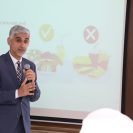Feehaid Al-Deehani (فهيد الديحاني ), a Kuwaiti with an affinity for shotguns, won a Bronze medal in the 2000 Summer Olympics, another one in the 2012 Summer Olympics, and a Gold medal in the 2016 Summer Olympics, all in Trap Shoot. Any way you slice it, Al-Deehani is a success, and yet, failure was present in equal measure. It can’t be any other way.
Consider Dude Perfect. Those trick shots are mind-blowing, and no matter how many times I watch them with my equally awestruck grandsons, I am impressed. You know what else impresses me? Knowing it is impossible for those shots to happen without uncountable failures. It’s called ‘practice’ and I am astounded to think of the hours and hours and hours of shots that were done before the successful ones were recorded. (Check out these guys on YouTube!)
Whatever societal norms are, we most often measure success mentally, against the expectations we had of our own performance. This is the way in which most of us measure success – by comparing our actual performance or achievement to a “hoped-for” outcome. This is also the way we measure failure. We believe not achieving the expected outcome is failure, and the resulting self talk is excruciatingly painful.
In fact, it is completely impossible to be successful without experiencing failure. We generally fear the thought of failing, and will do everything we can to avoid it, even to the point of lying about it. ‘Failure’ has a bad rap, but I would suggest that failure is a necessary component of success, and that the real fail is quitting.
Dr. Angela Duckworth (Penn State University), author of the book, “Grit. The Power of Passion and Perseverance,” has done years of research on what makes people successful. The data is very clear. It’s not about talent, abilities, money, opportunities, or wasta (y’all know what I’m talking about). Success is all about attitude. Specifically, a ‘never give up’ attitude. Dr. Duckworth states, “The highly accomplished in any field are paragons of perseverance.”
Turns out, the true secret of success is grit. Yes, grit. That old-fashioned idea that not quitting is the best way to succeed. Think about it. If Al-Deehani had quit shooting after his first miss, he would have been a tourist in the world of shooting. If he’d quit after a watching a thousand unbroken clay pigeons fall to the ground, he’d have been an experienced shooter, but still nothing special. That he evidently continued to shoot even after missing his 10,000th trap shot, is grit. That dogged determination to persevere to achieve an identified goal. Al-Deehani personifies the conclusion of Dr. Duckworth’s research. Successful people are never complacent, but they are satisfied with being unsatisfied.
Did you get that right there? The paradox of success is that we are satisfied with being unsatisfied. That we have not performed exactly as desired is reason to try again. Period. When we are satisfied with being unsatisfied, we are released from the internal cycle of shame and castigation because not performing well today (in anything) is simply an opportunity to try again tomorrow.
The pursuit of perfection actually paralyzes because it’s an impossible goal. Failure is not that we have been unsuccessful, but that we have quit trying. Every single time we fail, it is an opportunity to fine tune what we are doing so that we do it better next time. It’s a learning experience, a chance to practice, and the opportunity to exercise perseverance, thus developing grit. When failure is understood as inseparable from success, then the reality of trying eleventy-three times (this is how small grandsons count) and failing, is accepted, processed, and manifested as the grit required to achieve our goals.
How does this matter practically? Start small. Start young. School is a great place. When a child’s grades are not what they could be, model and teach your child perseverance. “What do we need to do differently to change this grade?” “How will we work smarter, not harder for a better grade?” For yourself at home, at work, at play…ask, “If I were to apply grit to this problem, what do I need to practice…do again…relearn…change… in order to move toward a more satisfying outcome?”
Reframe your definition of failure. Missing the mark is an opportunity to try again. Check out Dr. Angela Duckworth on YouTube, or pick up her book – you won’t be sorry.
Dr Susannah is a leading psychologist, registered professional counsellor and Master Practitioner in Clinical Counselling based in Canada. Be sure to follow @drsusannah on Twitter and Instagram.








